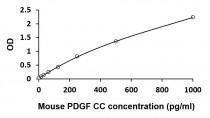ARG82517
Mouse PDGF CC ELISA Kit
Mouse PDGF CC ELISA Kit for ELISA and Mouse
Component
| Cat No | Component Name | Package | Temp |
|---|---|---|---|
| ARG82517-001 | Antibody-coated microplate | 8 X 12 strips | 4°C. Unused strips should be sealed tightly in the air-tight pouch. |
| ARG82517-002 | Standard | 2 X 10 ng/vial | 4°C |
| ARG82517-003 | Standard/Sample diluent | 30 ml (Ready to use) | 4°C |
| ARG82517-004 | Antibody conjugate concentrate (100X) | 1 vial (100 µl) | 4°C |
| ARG82517-005 | Antibody diluent buffer | 12 ml (Ready to use) | 4°C |
| ARG82517-006 | HRP-Streptavidin concentrate (100X) | 1 vial (100 µl) | 4°C |
| ARG82517-007 | HRP-Streptavidin diluent buffer | 12 ml (Ready to use) | 4°C |
| ARG82517-008 | 25X Wash buffer | 20 ml | 4°C |
| ARG82517-009 | TMB substrate | 10 ml (Ready to use) | 4°C (Protect from light) |
| ARG82517-010 | STOP solution | 10 ml (Ready to use) | 4°C |
| ARG82517-011 | Plate sealer | 4 strips | Room temperature |
Overview
| Product Description | ARG82517 Mouse PDGF CC ELISA Kit is an Enzyme Immunoassay kit for the quantification of Mouse PDGF CC in serum, plasma (EDTA, heparin) and cell culture supernatants. |
|---|---|
| Tested Reactivity | Ms |
| Tested Application | ELISA |
| Target Name | PDGF CC |
| Conjugation | HRP |
| Conjugation Note | Substrate: TMB and read at 450 nm. |
| Sensitivity | 10 pg/ml |
| Sample Type | Serum, plasma (EDTA, heparin) and cell culture supernatants. |
| Standard Range | 15.6 - 1000 pg/ml |
| Sample Volume | 100 µl |
| Precision | Intra-Assay CV: 4.8% Inter-Assay CV: 6.3% |
| Alternate Names | Spinal cord-derived growth factor; Fallotein; PDGFC receptor-binding form; SCDGF; FALLOTEIN; VEGF-E; Platelet-derived growth factor C; PDGFC latent form; PDGF-C |
Application Instructions
| Assay Time | ~ 5 hours |
|---|
Properties
| Form | 96 well |
|---|---|
| Storage Instruction | Store the kit at 2-8°C. Keep microplate wells sealed in a dry bag with desiccants. Do not expose test reagents to heat, sun or strong light during storage and usage. Please refer to the product user manual for detail temperatures of the components. |
| Note | For laboratory research only, not for drug, diagnostic or other use. |
Bioinformation
| Database Links | |
|---|---|
| Gene Symbol | PDGFC |
| Gene Full Name | platelet derived growth factor C |
| Background | The protein encoded by this gene is a member of the platelet-derived growth factor family. The four members of this family are mitogenic factors for cells of mesenchymal origin and are characterized by a core motif of eight cysteines. This gene product appears to form only homodimers. It differs from the platelet-derived growth factor alpha and beta polypeptides in having an unusual N-terminal domain, the CUB domain. Alternatively spliced transcript variants have been found for this gene. [provided by RefSeq, Sep 2010] |
| Function | Growth factor that plays an essential role in the regulation of embryonic development, cell proliferation, cell migration, survival and chemotaxis. Potent mitogen and chemoattractant for cells of mesenchymal origin. Required for normal skeleton formation during embryonic development, especially for normal development of the craniofacial skeleton and for normal development of the palate. Required for normal skin morphogenesis during embryonic development. Plays an important role in wound healing, where it appears to be involved in three stages: inflammation, proliferation and remodeling. Plays an important role in angiogenesis and blood vessel development. Involved in fibrotic processes, in which transformation of interstitial fibroblasts into myofibroblasts plus collagen deposition occurs. The CUB domain has mitogenic activity in coronary artery smooth muscle cells, suggesting a role beyond the maintenance of the latency of the PDGF domain. In the nucleus, PDGFC seems to have additional function. [UniProt] |
| Cellular Localization | Cytoplasm, cytosol. Secreted. Nucleus. Cytoplasmic granule. Cell membrane. Note=Sumoylated form is predominant in the nucleus (PubMed:15247255). Stored in alpha granules in platelets (PubMed:15061151). [UniProt] |
| Highlight | Related products: PDGF antibodies; PDGF ELISA Kits; New ELISA data calculation tool: Simplify the ELISA analysis by GainData |
| PTM | Proteolytic removal of the N-terminal CUB domain releasing the core domain is necessary for unmasking the receptor-binding epitopes of the core domain. Cleavage after basic residues in the hinge region (region connecting the CUB and growth factor domains) gives rise to the receptor-binding form. Cleaved by PLAT and PLG. Sumoylated with SUMO1. N-glycosylated. [UniProt] |
Images (1) Click the Picture to Zoom In
| Title | Download Link |
|---|---|
| ARG82517 Mouse PDGF CC ELISA Kit User manual |
 Download Download
|






